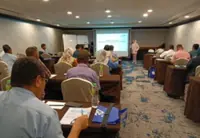Indah Water Konsortium manages nearly 7,500 water sewage plants across the country.
IT’S easy to take our efficient sewerage system for granted. A single flush, and all waste vanishes. But what really happens after?
Since 1994, Indah Water Konsortium (IWK) has been tasked with the mammoth responsibility of managing and maintaining Malaysia’s public sewage system – they clean the unseen.
To enhance this efficiently-managed sewage systems, the federal government has allocated RM1.7bil in Rolling Plan 3, under the 12th Malaysia Plan (12MP), to develop sustainable infrastructure through the implementation of sewerage projects throughout the country.
Minister of Natural Resources, Environment and Climate Change (NRECC) Nik Nazmi Nik Ahmad, explained that the allocation is part of an ongoing effort to modernise Malaysia’s sewerage infrastructure, and ensure efficient and sustainable sewerage services.
Up to this point, Malaysia has achieved a connected sewerage service rate of 85.4% in major cities, and aims to achieve 90% sewerage coverage by the end of 12MP in 2025.
This initiative aligns with the Malaysia Madani primary objective of enhancing the well-being of its people, while supporting the 6th goal of the Sustainable Development Goal (SDGs) – ensuring access to sustainable water management and sanitation for all.
Out of sight
Despite the progress, there are still many who may not fully grasp the magnitude and importance of our sewerage system.
In Malaysia, the most common sewerage system is known as the connected system.
With this system, waste water travels through a network of underground pipes to IWK sewage treatment plants (STPs) where it is cleaned to eliminate water borne diseases and contamination.
Around the clock, thousands of IWK workers at STPs first run pre-treatments, where solids and large substances are removed, before microbes are introduced to break down wastewater.
The wastewaters are then channelled into clarifiers for a certain duration to let sediments in the water sink to the bottom, while clearing the water of any particles, be it oil or natural organic matter. This clear, safe, odourless water is what is then discharged into waterways.
IWK chief executive officer Narendran Maniam explained that there also are more traditional types of sewerage systems in Malaysia, such as the individual septic tanks (IST) and the communal septic tanks (CST) – which IWK also manages.
Septic tanks are non-connected, self-contained sewage systems used by properties to temporarily store both sewage and sludge.
Sludge that enters the septic tank will settle naturally at the bottom of the tank’s base, allowing for the clean water to rise and flow out towards the drainage systems.
This method is less efficient, as over time, tanks reach their fullest capacity and require periodic emptying or desludging – a process that prevents the accumulation of hardened sludge or overflow that can cause environmental harm.
Narendran noted that IWK has sent out 627,000 scheduled desludging notices to properties using septic tank systems. “Of the 627,000 notices distributed since 2021, only 8.8% have contacted IWK to schedule a date for the desludging services,” he added.
Based on the Water Services Industry Regulations (Sewage Disposal Services) 2021 under the Waster Services Industry Act 2006, all owners or occupants of any premises connected to, or own a septic tank, are required to carry out desludging exercises on a scheduled basis.
Keeping it running
Narendran noted that the substantial growth in sewerage bill collections last year, however, reflected heightened awareness among IWK customers about the importance of paying sewerage bills.
This collection is vital for sustaining the company’s operations, which encompass the management of nearly 7,500 sewage treatment plants and the maintenance of over 22,000km of sewage pipelines across Peninsular Malaysia, including the Federal Territory of Labuan.
Narendran also highlighted the growing trend of IWK customers choosing electronic bills over printed ones.
By transitioning to e-Bills, IWK not only helps reduce paper waste and its environmental impact, but also offers customers a more convenient bill management system directly accessible on their mobile phones.






